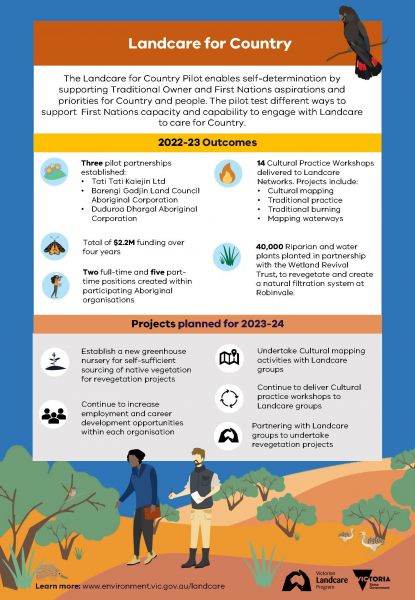The following resources include guidelines, protocols, links and factsheets which will assist volunteer groups to; navigate Cultural Heritage Assessments for grants, engagement practices, identifying your local First Nation group, understanding Welcome to Country and Acknowledgement of Country and more.
Engaging Traditional Owners
All Victorians – including government departments, agencies, councils, land and resource managers, developers and tourism operators – should be aware that Traditional Owners have legal rights and interests across their Country. It is important that consideration is given to Traditional Owner rights and interests at the earliest stages of all new projects and activities.
Who do I engage?
Check the map for contact details and links of formally recognised Traditional Owner groups in Victoria, available on Achris
If your project or activity area covers more than one formally recognised Traditional Owner group, you should engage with each group.
If there is no Traditional Owner group formally appointed for the area, engage broadly and inclusively with Traditional Owners who assert rights and interests in the area. This may include Traditional Owner families and groups without formal recognition and neighbouring Traditional Owner corporations with formal recognition.
More Information
Factsheet: Guidance on Engaging Traditional Owners
Link: Engaging Traditional Owners | firstpeoplesrelations.vic.gov.au
Welcome to Country and Acknowledgement of Traditional Owners
A Welcome to Country or an Acknowledgement of Traditional Owners recognises the continuing connection of Aboriginal Traditional Owners to their Country. Victoria has a strong and proud Aboriginal history, comprising of complex ownership and land stewardship systems stretching back many thousands of years.
The Victorian Government supports Welcomes to Country and Acknowledgements of Traditional Owners as part of the process of reconciliation and healing, in addition to affording the appropriate respect to Traditional Owners of Country.
Welcome to Country
A Welcome to Country ceremony is performed by Aboriginal Traditional Owners for people visiting their Country. These ceremonies vary from speeches of welcome to traditional dance & smoking ceremonies.
More Information: Welcome to Country | firstpeoplesrelations.vic.gov.au
Acknowledgement of Traditional Owners
An Acknowledgement of Traditional Owners can be done by anyone. It's a way of showing awareness of, and respect for, the Aboriginal Traditional Owners of the land where a meeting or event is held.
More Information: Acknowledgement of Traditional Owners | firstpeoplesrelations.vic.gov.au
Cultural Heritage
Registered Aboriginal Parties (RAPS)
RAPs are the primary source of advice and knowledge on matters relating to Aboriginal places or Aboriginal objects in their region. Their core functions include:
- evaluating Cultural Heritage Management Plans
- assessing Cultural Heritage Permit applications
- making decisions about Cultural Heritage Agreements
- providing advice on applications for interim or ongoing Protection Declarations
- entering into Aboriginal Cultural Heritage Land Management Agreements with public land managers
- nominating Aboriginal intangible heritage to the Victorian Aboriginal Heritage Register and managing intangible heritage agreements.
Traditional Owner groups, legally recognised under the Aboriginal Heritage Act, with responsibilities for managing and protecting Aboriginal Cultural Heritage on Country.
Victoria's Registered Aboriginal Parties
See Victoria's Registered Aboriginal Parties or search the online map to find a Registered Aboriginal Party for an area of Victoria.
Victorian Aboriginal Heritage Council
Aboriginal Cultural Heritage Guide for community organisations
The Aboriginal Cultural Heritage Guide will assist community organisations delivering on-ground projects and activities in Victoria to better understand the State's Aboriginal cultural heritage management process.
Aboriginal Cultural Heritage considerations - DEECA
This Aboriginal Cultural Heritage fact sheet outlines considerations community groups must take to protect Aboriginal cultural heritage when applying for a grant.
Cultural Capability Training
Cultural capability is a broad term that encompasses cultural awareness, cultural safety and cultural competence.
Cultural capability training is an integral part of workplace, network or groups health and safety and is essential for enabling cultural safety in the workplace. Cultural capability training should be ongoing rather than just done once. There are many aspects to cultural capability training, such as: cultural awareness, cultural competency and unconscious bias.
Many Victorian Aboriginal and/or Torres Strait Islander organisations provide cultural training. Try to choose a local Aboriginal and/or Torres Strait Islander training provider who has knowledge of local Aboriginal and/or Torres Strait Islander history and culture. You should contact your local Traditional Owners or Local Aboriginal Community Controlled Organisation (ACCO) to discuss training options.
Some organisations have Traditional Owner Settlement Agreements and therefore must seek training through appropriate Traditional Owners.
The Deadly Story website has a list of Aboriginal and/or Torres Strait Islander service providers across Victoria. You can use the list to find an organisation local to your area.
More Information: Aboriginal and/or Torres Strait Islander cultural capability - VPSC
Landcare for Country Pilot Program
The Department of Energy, Environment and Climate Actions Victorian Landcare Program (VLP) launched the Landcare for Country Pilot in 2022.
The Pilot enables self-determination by supporting Traditional Owner and First Nations aspirations and priorities for Country and people.
The pilot aims to test different ways to support First Nations capacity and capability to engage with Landcare to care for Country.
There are currently 3 pilot partnerships established:
- Tati Tati Kaiejin Ltd
- Barengi GadjinLand Council Aboriginal Corporation
- Duduroa Dhargal Aboriginal Corporation
Click on the picture below for more.
If you would like to provide feedback or have questions regarding this page, please email landcare@deeca.vic.gov.au
Page last updated: 17/07/24
